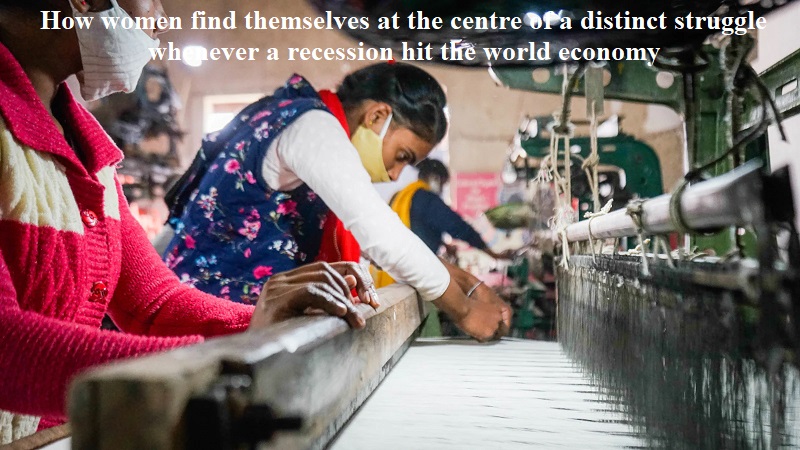
In times of global economic recession, women often find themselves at the forefront of a unique struggle, facing a myriad of gender-specific challenges. As economic pressures escalate, wage disparities widen, and opportunities dwindle.
A recession denotes an economic decline characterized by reduced economic activity, lower GDP, elevated unemployment rates, and decreased spending and investments. Multiple factors can contribute to its occurrence, which subsequently has adverse consequences on businesses, jobs, and overall economic expansion.
The ongoing worldwide economic downturn is distinctly impacting women. Research by the International Labour Organization reveals that, on average, women earn 20 percent less than men, although this figure varies significantly across different nations.
Furthermore, a recent Bankrate survey exposed that 74 percent of women exhibit more concern about the potential economic downturn in comparison to 65 percent of men. This discrepancy arises due to gender-based differences in preparations for an economic downturn.
Despite some progress in recent years, it is widely acknowledged that women remain more financially vulnerable than men. The persistent gender pay gap, particularly affecting women of color and mothers, detrimentally influences their capacity to accumulate wealth. This inequality also poses challenges in managing debt, spanning from credit card balances to student loans.
“Recession affects labor markets. Lack of skills and mobility constraints can hinder women’s reentry into the labor market after job losses due to recession,” remarked NIPFP’s Professor and economist Lekha S. Chakraborty.
During economic downturns, men and women experience distinct economic challenges rooted in various factors.
“Men and women are at asymmetrical levels of socio-economic development. Factors that can exacerbate this disparity include disparities in access and utilization of education, healthcare, and wages, as well as workforce participation,” Lekha stated.
In times of uncertainty, women tend to shoulder additional caregiving responsibilities, hindering their ability to engage in full-time work. Moreover, the existing gender pay gap compounds the issue, as women already earn less than men even before a recession occurs.
As a result, economic downturns can disproportionately impact women, giving rise to the term “shecession”—an economic recession that disproportionately affects women.
“The lack of care economy infrastructure is a significant factor contributing to gender disparities,” emphasized Lekha Chakraborty.
The care economy encompasses activities that cater to the physical, psychological, and emotional needs of individuals spanning various age groups.
This absence of care economy infrastructure has led to insufficient support systems for childcare, eldercare, and domestic responsibilities, which disproportionately burden women’s economic circumstances.
Consequently, this perpetuates the cycle of gender inequality, hindering women’s professional advancement and financial autonomy. Addressing the care economy gap is crucial for creating a more equitable society that enables both men and women to participate fully in the workforce while fulfilling vital caregiving roles.
The far-reaching impact of a crisis often places an uneven load of additional responsibilities on women during times of economic adversity. These challenges can have enduring repercussions on women’s lives.
Lekha pointed out that a recession affects the government’s fiscal capacity, which profoundly impacts women’s well-being.
“If the government reduces healthcare budgets during a recession, the care economy burden on women increases, as the reduced hospitalization days are compensated by care providers at home. The dual work burden on women intensifies during a recession, as fewer market-based care services are available,” she explained.
“Violence against women escalates during recessions, and the role of state mechanisms in supporting women against violence becomes crucial,” she added.

Post Your Comments